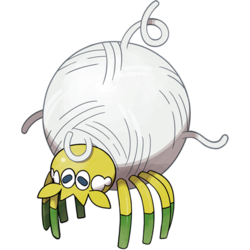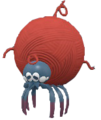From Bulbapedia, the community-driven Pokémon encyclopedia.
|
|
| Line 191: |
Line 191: |
| |name2=Spidops | | |name2=Spidops |
| |type1-2=Bug}} | | |type1-2=Bug}} |
| | |
|
| |
|
| ===Sprites=== | | ===Sprites=== |
| | <gallery> |
| | ShinyTarountula.png|thumb|The model for a Shiny Tarountula |
| | </gallery> |
|
| |
|
| ==Trivia== | | ==Trivia== |
Revision as of 21:57, 24 November 2022

|
The subject of this article is a Pokémon which has recently been announced.
This article's contents will change as more information becomes available, perhaps abruptly. Please be cautious when adding information to this article, as rumors and speculation can often be confused with facts. Avoid any information on this subject which is not confirmed by reliable sources.
|
Tarountula (Japanese: タマンチュラ Tamanchura) is a Bug-type Pokémon introduced in Generation IX.
It evolves into Spidops starting at level 15.
Biology
Tarountula is a lime-green arachnid Pokémon whose body is wrapped in a ball of white threads that it secretes from its rear. Its face has white patterns that flank its two eyes on either side, as well as two pairs of protrusions resembling chelicerae and pedipalps, which hides a tiny mouth on the bottom of its head. It has eight spindly legs tipped with a dark green color on the ends.
Tarountula can sometimes be found hanging upside down from trees using its thread. Tarountula's thread is elastic and strong as wire, being able to deflect even the attacks of its natural enemy Scyther. Research into the secret behind the thread's strength is currently ongoing.
In the anime
Major appearances
Minor appearances
In the manga
In the TCG
- Main article: Tarountula (TCG)
Game data
Pokédex entries
| This Pokémon was unavailable prior to Generation IX.
|
| Generation IX
|
|
|
Paldea
#12
|
| Scarlet
|
The ball of threads wrapped around its body is elastic enough to deflect the scythes of Scyther, this Pokémon’s natural enemy.
|
| Violet
|
The thread it secretes from its rear is as strong as wire. The secret behind the thread's strength is the topic of ongoing research.
|
|
|
Game locations
| This Pokémon was unavailable prior to Generation IX.
|
|
|
In side games
Held items
Stats
Base stats
| Stat
|
Range
|
| At Lv. 50
|
At Lv. 100
|
35
|
|
95 - 142
|
180 - 274
|
41
|
|
41 - 102
|
78 - 199
|
45
|
|
45 - 106
|
85 - 207
|
29
|
|
30 - 89
|
56 - 172
|
40
|
|
40 - 101
|
76 - 196
|
20
|
|
22 - 79
|
40 - 152
|
Total: 210
|
Other Pokémon with this total
|
- Minimum stats are calculated with 0 EVs, IVs of 0, and (if applicable) a hindering nature.
- Maximum stats are calculated with 252 EVs, IVs of 31, and (if applicable) a helpful nature.
|
Type effectiveness
| Under normal battle conditions in Generation IX, this Pokémon is:
|
|
|
|
|
|
|
|
|
|
|
|
|
Learnset
|
|
|
|
- Bold indicates a move that gets STAB when used by Tarountula
- Italic indicates a move that gets STAB only when used by an Evolution of Tarountula
|
|
|
|
|
- Bold indicates a move that gets STAB when used by Tarountula
- Italic indicates a move that gets STAB only when used by an Evolution or an alternate form of Tarountula
|
|
|
|
|
- Moves marked with an asterisk (*) must be chain bred onto Tarountula
- Bold indicates a move that gets STAB when used by Tarountula
- Italic indicates a move that gets STAB only when used by an Evolution of Tarountula
|
Side game data
Evolution
Sprites
The model for a Shiny Tarountula
Trivia
Origin
Tarountula may be based on spiders, such as the tarantula or the orb weaver spider. Its silk-covered abdomen evokes a yarn ball.
Name origin
Tarountula may be a combination of tarantula and round.
Tamanchura may be a combination of 球 tama (sphere) and tarantula.
In other languages
| Language
|
Title
|
Meaning
|
 Japanese Japanese
|
タマンチュラ Tamanchura
|
From 球 tama and tarantula
|
 French French
|
Tissenboule
|
From tisse and boule
|
 Spanish Spanish
|
Tarountula
|
Same as English name
|
 German German
|
Tarundel
|
From Tarantel and rund
|
 Italian Italian
|
Tarountula
|
Same as English name
|
 Korean Korean
|
타랜툴라 Taraentulla
|
From 타래 tarae and tarantula
|
 Mandarin Chinese Mandarin Chinese
|
團珠蛛 / 团珠蛛 Tuánzhūzhū
|
From 團 / 团 tuán , 珠 zhū, and 蜘蛛 zhīzhū
|
 Cantonese Chinese Cantonese Chinese
|
團珠蛛 Tyùhnjyūjyū
|
From 團 tyùhn, 珠 jyū, and 蜘蛛 jījyū
|
|
|
|
|
|
|
|
Related articles
External links

|
This Pokémon article is part of Project Pokédex, a Bulbapedia project that aims to write comprehensive articles on each Pokémon species, as well as Pokémon groups and forms.
|





